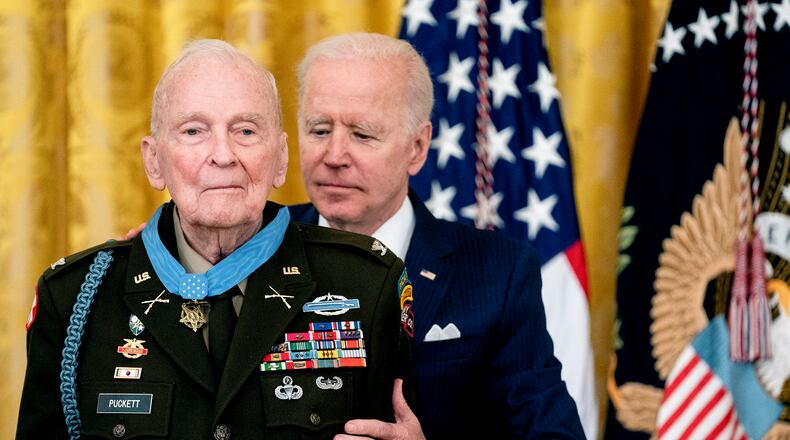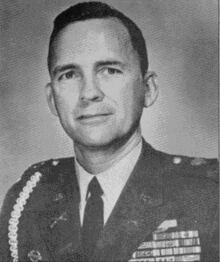Ralph Puckett Jr., a retired U.S. Army colonel from Columbus who received the Medal of Honor for his heroic actions during the Korean War, died Monday. He was 97.
President Joe Biden presented the medal to Puckett in 2021, citing his efforts at capturing Hill 205 in Korea and holding it against relentless waves of Chinese counterattacks. Outnumbered by about 10 to 1, Puckett’s elite Ranger unit was overrun and hand-to-hand combat ensued.
Puckett, who was wounded in the thigh by an enemy grenade, continued calling in artillery support until enemy mortar rounds grievously injured him. He told his fellow Rangers to leave him behind, but they dragged him down the hill to safety.
“I had been wounded three times by then, and I was lying there on the foxhole unable to do anything,” he recalled in an interview for the Witness to War Foundation. “I could see three Chinese about 15 yards away from me, and they were bayoneting or shooting some of my wounded Rangers who were in the foxholes.”
Puckett, then a first lieutenant, refused a medical discharge from the military and served with the 101st Airborne Division during the Vietnam War. He retired from the Army in 1971 and created a leadership and teamwork development program called Discovery Inc. He also served as the first Honorary Colonel of the 75th Ranger Regiment at Fort Moore.
Puckett also earned two Distinguished Service Crosses, two Silver Stars, two Bronze Star Medals with V device and five Purple Hearts.
Credit: Courtesy of U.S. Army
Credit: Courtesy of U.S. Army
“He leads from the front. He leads by example. He leads with his heart,” Biden said before draping the Medal of Honor around Puckett’s neck at a White House ceremony. “He is a Ranger.”
Moon Jae-in, South Korea’s president in 2021, attended the ceremony, calling Puckett a “true hero of the Korean War.”
“With extraordinary valor and leadership, he completed missions until the very end, defending Hill 205 and fighting many more battles,” Moon said. “Without the sacrifice of veterans, including Col. Puckett and the Eighth Army Ranger Company, the freedom and democracy we enjoy today could not have blossomed in Korea.”
Born in Tifton, Puckett graduated from the U.S. Military Academy at West Point and was commissioned a second lieutenant in 1949. He was assigned to Japan when he volunteered for the Eighth Army Ranger Company, a unit formed shortly after the Korean War began.
J.D. Lock was teaching at West Point and researching Ranger history when he learned of Puckett’s heroism during the Korean War. With the support of U.S. Sens. John McCain of Arizona and Zell Miller of Georgia, Lock advocated for Puckett to receive the Medal of Honor.
“Many will say that Col. Puckett ‘led by example,’” Lock said in Puckett’s obituary. “I would rather say that Col. Puckett ‘lived by example.’”
Lock recruited top U.S. military officials to the cause, including retired U.S. Army Gen. Stanley McChrystal, who led Joint Special Operations Command.
“If we measure Ralph Puckett’s accomplishments and we only include the Medal of Honor, we are almost missing the point,” McChrystal said in his obituary. “Ralph Puckett’s awards are thousands of young Rangers, many of whom were still fairly young, that he’s touched by his example and his actions. That’s the real monument to him.”
Puckett was preceded in death by his parents, Clara Steadman Puckett and Ralph Atticus Puckett; sister, Clara Puckett Winston; brother, Thomas Steadman Puckett; and daughter, Jean Puckett Raney. He is survived by his wife, Jeannie Martin Puckett; daughter, Martha Lane Puckett Wilcoxson; and son, Thomas Martin Puckett. He is also survived by six grandchildren and four greatgrandchildren.
A public celebration of life ceremony for Puckett will be held at the National Infantry Museum near Fort Moore on April 20 at 11 a.m.
“Like thousands of other Rangers, we loved the best Ranger,” said Retired Col. Rob Choppa, president of the National Infantry Association. “He was truly the best among us.”
Credit: NYT
Credit: NYT
Credit: Stefani Reynolds/The New York Times
Credit: Stefani Reynolds/The New York Times
Credit: AJC file photo
Credit: AJC file photo
About the Author
Keep Reading
The Latest
Featured












